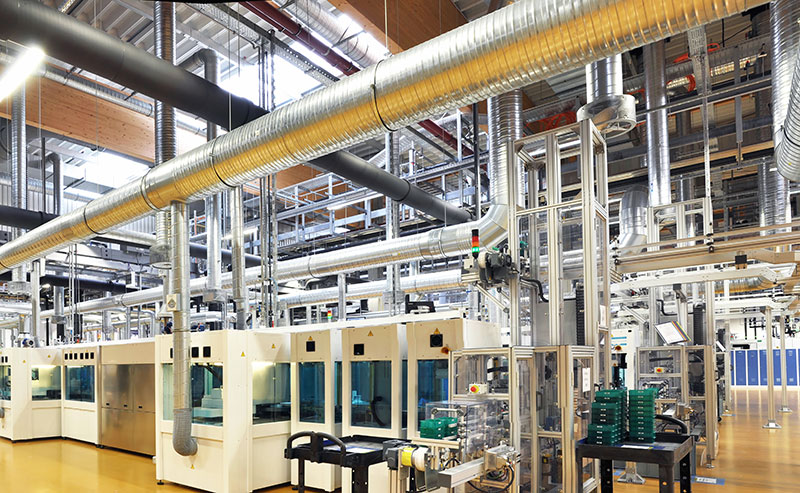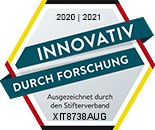
Um exzellenter Digitalisierungspartner sein und bleiben zu können, investiert XITASO in Forschung und Innovation. Unser Ansatz ist es, Zukunftsthemen gemeinsam mit Partnern aus Wissenschaft und Wirtschaft intensiv zu beleuchten und mögliche Anwendungen für uns und unsere Partner herauszuarbeiten. Dabei lassen wir uns von Herausforderungen aus der Praxis inspirieren, denen wir in unserer täglichen Arbeit mit unseren Kunden begegnen. So bieten wir den Raum für bestmögliche anwendungsnahe Forschung und einen Bezug zu heutigen und zukünftigen Märkten.
Wissenschaftliche Exzellenz sowie nationaler und internationaler Austausch mit der Wissenschafts-Community gehören zur Forschung bei XITASO ebenso wie selbstorganisiertes Arbeiten in einem agilen, firmenübergreifenden Forschungsteam. Wir sind überzeugt: So kann Forschung von heute Innovationen von morgen erzeugen.
Was uns antreibt
Unsere Technologiebereiche
Unsere Forschungsprojekte
Wissensextraktion aus Daten zur Anomaliebehebung
Verwaltungsschale einfach nutzbar machen
Intelligente Steuerung von Intensivkapazitäten
T3 – Test the Test
Das Forschungsvorhaben “Test the Test” (T3) hat sich zum Ziel gesetzt, die Effektivität von Model-, Software- und Hardwaretests automatisiert zu bewerten und damit die Qualität der Tests zu verbessern. Mithilfe von Fault Injection und Mutationen werden Hardwareschnittstellen, Code und Systemmodelle absichtlich und systematisch mit Fehlern behaftet, um entsprechende Tests hinsichtlich ihrer Qualität und Effektivität beim Auffinden eben jener Fehler bewerten zu können. Die Verbesserung der Testqualität hilft, den immer größer werdenden Qualitätsanforderungen eingebetteter Systeme zu genügen.
AIPE – Automatisierte Inbetriebnahme durch Persistierung von Expertenwissen
Ziel des Projekts „Automatisierte Inbetriebnahme durch Persistierung von Expertenwissen“ (AIPE) ist es zum einen, die Feineinstellung von Maschinenparametern durch maschinelle Lernverfahren zu automatisieren. Zum anderen soll Expertenwissen maschinell persistiert werden, um es trotz des demographischen Wandels erhalten zu können. Die Zusammenführung beider Bereiche ermöglicht es, die maschinellen Lernprozesse mithilfe des Expertenwissens zu vereinfachen und zu beschleunigen. Im Projekt wird 3D-Druck als Stellvertreter für Fertigungsprozesse untersucht, die von Umgebungseinflüssen abhängen.
HITSSSE – Höhere IT-Sicherheit durch Sichere Software Entwicklung
Ziel des Projekts HITSSSE ist die Verbesserung der IT-Sicherheit durch sichere Software-Entwicklung für kleine und mittlere Unternehmen. Generische Lösungsansätze sollen hier KMUs in Deutschland helfen, IT-Sicherheit kosteneffizient und einfach nutzbar zu machen. XITASO bringt seine Expertise als assoziierter Partner in dem Projekt ein.
Eine Auswahl unserer Stellenausschreibungen
Eine Auswahl unserer Veröffentlichungen
2024
-
Measuring Similarities in Model Structure of Metaheuristic Rule Set Learners
David Pätzel, Richard Nordsieck, Jörg Hähner
EvoAPPS 2024 -
Tracking assets in source code with Security Annotations
Daniel Haak, Raphael Mayr, Jan-Philipp Steghöfer, Alexandra Teynor, Phillip Heidegger
ICSE 2024 Poster Track -
Where Requirements and Agility Meet: No Man’s Land or a Land of Opportunity?
Fabiano Dalpiaz, Jan-Philipp Steghöfer
To appear in IEEE Software -
Combining Requirements Enigneering Techniques for the Analysis of a Legacy System
Jessica Friedline, Jan-Philipp Steghöfer
Joint Proceedings of REFSQ-2024 Workshops, Doctoral Symposium, Posters & Tools Track and Education and Training Track. Co-located with REFSQ 2024. Winterthur, Switzerland, April 8, 2024
PDF-Download
2023
- Contrastive pretraining of regression tasks in reliability forecasting of automotive electronics.
Emilio Zarbali, Alwin Hoffmann, Jonas Hepp
22nd International Conference on Machine Learning and Applications (ICMLA 2023), Jacksonville, Florida, USA, Dez. 2023. -
FeatRacer: Locating Features Through Assisted Traceability
Mukelabai Mukelabai, Kevin Hermann, Thorsten Berger, Jan-Philipp Steghöfer
IEEE Transactions on Software Engineering, 2023
Hier lesen -
Processes, Methods, and Tools in Model-based Engineering — A Qualitative Multiple-Case Study
Jörg Holtmann, Grischa Liebel, Jan-Philipp Steghöfer
Journal of Software and Systems, 2023
PDF-Download -
Blended modeling in commercial and open-source model-driven software engineering tools: A systematic study.
Istvan David, Malvina Latifaj, Jakob Pietron, Weixing Zhang, Federico Ciccozzi, Ivano Malavolta, Alexander Raschke, Jan-Philipp Steghöfer, Regina Hebig
Softw. Syst. Model.22(1): 415-447 (2023)
Hier lesen -
CASCADE: An Asset-driven Approach to Build Security Assurance Cases for Automotive Systems.
Mazen Mohamad, Rodi Jolak, Örjan Askerdal, Jan-Philipp Steghöfer, Riccardo Scandariato
ACM Trans. Cyber Phys. Syst. 7(1): 3:1-3:26 (2023)
Hier lesen -
Trustful Model-Based Information Exchange in Collaborative Engineering.
David Schmelter, Jan-Philipp Steghöfer, Karsten Albers, Mats Ekman, Jörg Tessmer, Raphael Weber
EuroSPI (1) 2023: 156-170
Hier lesen -
Exploiting Meta-Model Structures in the Generation of Xtext Editors.
Jörg Holtmann, Jan-Philipp Steghöfer, Weixing Zhang.
Proceedings of the 11th International Conference on Model-Based Software and Systems Engineering (MODELSWARD).
PDF-Download -
Creating Python-style Domain Specific Languages: A Semi-automated Approach and Intermediate Results.
Weixing Zhang, Regina Hebig, Jan-Philipp Steghöfer, Jörg Holtmann.
Proceedings of the 11th International Conference on Model-Based Software and Systems Engineering (MODELSWARD).
PDF-Download
-
Automated Extraction of Grammar Optimization Rule Configurations for Metamodel-Grammar Co-evolution.
Weixing Zhang, Regina Hebig, Daniel Strüber, Jan-Philipp Steghöfer
SLE 2023: 84-96
PDF-Download
2022
- Predicting thermal resistance of solder joints based on Scanning Acoustic Microscopy using Artificial Neural Networks.
Andreas Zippelius, Tobias Strobl, Maximilian Schmid, Joseph Hermann, Alwin Hoffmann, Gordon Elger.
9th Electronics System-Integration Technology Conference (ESTC 2022). - Identifying security-related requirements in regulatory documents based on cross-project classification.
Mazen Mohamad, Jan-Philipp Steghöfer, Alexander Åström, and Riccardo Scandariato.
Proceedings of the 18th International Conference on Predictive Models and Data Analytics in Software Engineering (PROMISE’22), pp. 82-91. - A Closer Look at Sum-based Embedding Aggregation for Knowledge Graphs Containing Procedural Knowledge.
Richard Nordsieck, Michael Heider, Anton Hummel, Jörg Hähner.
6th International Workshop On Deep Learning For Knowledge Graphs (DL4KG) at the 21th International Semantic Web Conference (ISWC 2022).
PDF-Download - Towards Conceptual and Procedural Models of Operator Knowledge in Industrial Information Models.
Richard Nordsieck, Anton Hummel, Michael Heider, Alwin Hoffmann, Jörg Hähner.
First International Workshop On Semantic Industrial Information Modelling (SemIIM) at the 19th Extended Semantic Web Conference (ESWC 2022).
PDF-Download - Reliability-Based Aggregation of Heterogeneous Knowledge to Assist Operators in Manufacturing.
Richard Nordsieck, Michael Heider, Alwin Hoffmann, Jörg Hähner.
2022 IEEE 16th International Conference on Semantic Computing (ICSC).
2021
- Learning Classifier Systems for Self-Explaining Socio-Technical-Systems.
Michael Heider, Richard Nordsieck, Jörg Hähner.
Proceedings of the LIFELIKE 2021 – 9th Edition in the Evolution of the Workshop Series of Autonomously Learning and Optimizing Systems (SAOS).
PDF-Download - CAD-based Grasp and Motion Planning for Process Automation in Fused Deposition Modelling.
Andreas Wiedholz, Michael Heider, Richard Nordsieck, Andreas Angerer, Simon Dietrich, Jörg Hähner.
International Conference on Informatics in Control, Automation and Robotics (ICINCO).
Link - Knowledge Extraction via Decentralized Knowledge Graph Aggregation.
Richard Nordsieck, Michael Heider, Anton Winschel, Jörg Hähner.
IEEE International Conference on Semantic Computing (ICSC).
PDF-Download
2020
- Evaluating the Effect of User-Given Guiding Attention on the Learning Process.
Richard Nordsieck, Michael Heider, Andreas Angerer, Jörg Hähner.
IEEE International Conference on Autonomic Computing and Self-Organizing Systems (ACSOS).
Link - Interactive Knowledge-Guided Learning.
Richard Nordsieck & Jörg Hähner.
IEEE International Conference on Autonomic Computing and Self-Organizing Systems Companion (ACSOS-C).
Link - Opportunities and Limitations of Mixed Reality Holograms in Industrial Robotics.
Michael Filipenko, Andreas Angerer, Alwin Hoffmann, Wolfgang Reif.
Factory of the Future: How to digitalize the robot-aided manufacturing process in Industry 4.0? Part of the 2019 IEEE/RSJ International Conference on Intelligent Robots and Systems (IROS).
PDF-Download
2019
- Towards Automated Parameter Optimization by Persisting Expert Knowledge.
Richard Nordsieck, Michael Heider, Andreas Angerer, Jörg Hähner.
International Conference on Informatics in Control, Automation and Robotics (ICINCO).
PDF-Download
2018
- partsival – Collision-based Particle and many-body Simulations on GPUs for Planetary Exploration Systems.
Roy Lichtenheldt, Simon Kerler, Andreas Angerer, Wolfgang Reif.
Joint International Conference on Multibody System Dynamics (IMSD).
PDF-Download
Section
2023
- Creating Python-style Domain Specific Languages: A Semi-automated Approach and Intermediate Results.
Weixing Zhang, Regina Hebig, Jan-Philipp Steghöfer, Jörg Holtmann.
Proceedings of the 11th International Conference on Model-Based Software and Systems Engineering (MODELSWARD). - Exploiting Meta-Model Structures in the Generation of Xtext Editors.
Jörg Holtmann, Jan-Philipp Steghöfer, Weixing Zhang.
Proceedings of the 11th International Conference on Model-Based Software and Systems Engineering (MODELSWARD).
2022
- Predicting thermal resistance of solder joints based on Scanning Acoustic Microscopy using Artificial Neural Networks.
Andreas Zippelius, Tobias Strobl, Maximilian Schmid, Joseph Hermann, Alwin Hoffmann, Gordon Elger.
9th Electronics System-Integration Technology Conference (ESTC 2022). - Identifying security-related requirements in regulatory documents based on cross-project classification.
Mazen Mohamad, Jan-Philipp Steghöfer, Alexander Åström, and Riccardo Scandariato.
Proceedings of the 18th International Conference on Predictive Models and Data Analytics in Software Engineering (PROMISE’22), pp. 82-91. - A Closer Look at Sum-based Embedding Aggregation for Knowledge Graphs Containing Procedural Knowledge.
Richard Nordsieck, Michael Heider, Anton Hummel, Jörg Hähner.
6th International Workshop On Deep Learning For Knowledge Graphs (DL4KG) at the 21th International Semantic Web Conference (ISWC 2022).
PDF-Download - Towards Conceptual and Procedural Models of Operator Knowledge in Industrial Information Models.
Richard Nordsieck, Anton Hummel, Michael Heider, Alwin Hoffmann, Jörg Hähner.
First International Workshop On Semantic Industrial Information Modelling (SemIIM) at the 19th Extended Semantic Web Conference (ESWC 2022).
PDF-Download - Reliability-Based Aggregation of Heterogeneous Knowledge to Assist Operators in Manufacturing.
Richard Nordsieck, Michael Heider, Alwin Hoffmann, Jörg Hähner.
2022 IEEE 16th International Conference on Semantic Computing (ICSC).
2021
- Learning Classifier Systems for Self-Explaining Socio-Technical-Systems.
Michael Heider, Richard Nordsieck, Jörg Hähner.
Proceedings of the LIFELIKE 2021 – 9th Edition in the Evolution of the Workshop Series of Autonomously Learning and Optimizing Systems (SAOS).
PDF-Download - CAD-based Grasp and Motion Planning for Process Automation in Fused Deposition Modelling.
Andreas Wiedholz, Michael Heider, Richard Nordsieck, Andreas Angerer, Simon Dietrich, Jörg Hähner.
International Conference on Informatics in Control, Automation and Robotics (ICINCO).
Link - Knowledge Extraction via Decentralized Knowledge Graph Aggregation.
Richard Nordsieck, Michael Heider, Anton Winschel, Jörg Hähner.
IEEE International Conference on Semantic Computing (ICSC).
PDF-Download
2020
- Evaluating the Effect of User-Given Guiding Attention on the Learning Process.
Richard Nordsieck, Michael Heider, Andreas Angerer, Jörg Hähner.
IEEE International Conference on Autonomic Computing and Self-Organizing Systems (ACSOS).
Link - Interactive Knowledge-Guided Learning.
Richard Nordsieck & Jörg Hähner.
IEEE International Conference on Autonomic Computing and Self-Organizing Systems Companion (ACSOS-C).
Link - Opportunities and Limitations of Mixed Reality Holograms in Industrial Robotics.
Michael Filipenko, Andreas Angerer, Alwin Hoffmann, Wolfgang Reif.
Factory of the Future: How to digitalize the robot-aided manufacturing process in Industry 4.0? Part of the 2019 IEEE/RSJ International Conference on Intelligent Robots and Systems (IROS).
PDF-Download
2019
- Towards Automated Parameter Optimization by Persisting Expert Knowledge.
Richard Nordsieck, Michael Heider, Andreas Angerer, Jörg Hähner.
International Conference on Informatics in Control, Automation and Robotics (ICINCO).
PDF-Download
2018
- partsival – Collision-based Particle and many-body Simulations on GPUs for Planetary Exploration Systems.
Roy Lichtenheldt, Simon Kerler, Andreas Angerer, Wolfgang Reif.
Joint International Conference on Multibody System Dynamics (IMSD).
PDF-Download
Unsere Partner
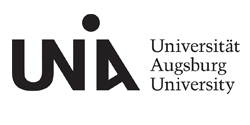

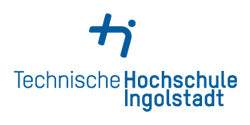

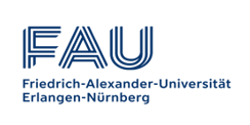


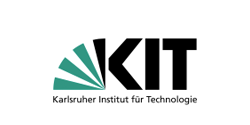
“Mit Forschungs- und Innovationsprojekten erkunden wir das Potenzial der Technologien von morgen. Dazu vernetzen wir uns mit starken Partnern und investieren bewusst in exzellente Nachwuchsforscher.”
Dr. Andreas Angerer
Head of Research and Innovation
XITASO GmbH
Sie interessieren sich für ein Projekt, eine Leistung oder haben eine sonstige Frage?

Dr. Andreas Angerer
Tel. +49 821 885882-94
andreas.angerer@xitaso.com



